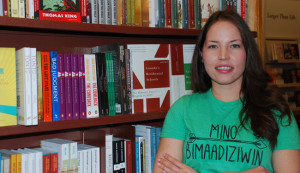No English, please. Anishinaabemowin-only academy opens near Manitoulin Island

By Laura E. Young
ESPANOLA – As sparks and embers from the campfire spiral into the night sky, quiet conversation in rhythmic tones of Anishinaabemowin beat in time with the waters lapping the rocks of Anderson Lake.
This is not memory from days long gone; indeed this will be reality at Shki-nishnaabemjign, the first Anishnaabbemowin immersion program for Northeastern Ontario. The program opens July 10-29, 2016.
This is a three-week, total immersion in Anishinaabemowin. No English will be permitted. It will be held at the Anishinabe Spiritual Centre on Anderson Lake near Espanola, en route to Manitoulin Island.
A collective of young teachers and learners have joined with Kenjgewin Teg Educational Institute based in M’Chigeeng, Ontario, on Manitoulin, to facilitate the program. The team seeks to increase the proficiency of Anishinaabemowin speakers; the academy is a step along the path to preserving the language for future generations.
Jessica Benson of Atikameksheng Anishnawbek First Nation near Sudbury and Rama First Nation near Orillia; Monty McGahey of Chippewas of the Thames; and Mskwaankwad Rice of Wasauksing will facilitate the program.
Spots are limited. Registration closed on June 24.
“They have opened the academy to people ages 18 and up because they are more aware of their choices and what they want to be”, said McGahey.
“They are looking for learners who are as passionate about Anishinaabemowin and revitalizing it as we are,” added McGahey.
“There’s a gap in the Anishinaabemowin system where students who want to learn more or speak more after they’ve finished a course or program, don’t have a place to go. There aren’t a lot of immersion-type programs that are offered for students to move up in proficiency in speaking and understanding the language,” he said.
“The teachers and fluent speakers are being confirmed. Benson, Rice and Monty will facilitate. They are intermediate level in their fluency so they seek to help bridge the communication gaps between the fluent speakers and the new learners”, McGahey noted.
“As I learned our history as Anishinaabeg, I realized that not only was our land stolen from us, but our culture and language was stolen from us as well, through the residential school system,” stated McGahey.
He has travelled far and wide to explore and learn his culture and language. He studied in the Anishinaabemowin Immersion Certificate Program offered at Sault College. He attended an immersion program in Walpole Island, Maatookiidaa Anishinaabewin (meaning Let’s Share the Anishinaabe Ways of Life) from 2010-2014.
He attended the Ojibwemotaadidaa Omaa Gidakiiminaang Ojibwe Immersion Academy, in June of 2015 and plans to return to the Cloquet, Minnesota-based academy before teaching at Shki-nishnaabemjig.
He has also taught evening community classes in his community since 2008, and Anishinaabemowin classes at Georgian College in Barrie.
His community, Chippewas of the Thames, had a residential school within the community that greatly affected the survival of the culture and language. There are no first language Anishinaabemowin speakers left living in his community, he says.
“I feel that the language is important to revitalize in order to say we are Anishinaabeg, spiritually, emotionally, and politically,” he adds.
Benson is a Grade One immersion teacher who instructs physical education in Ojibwe to her students in M’chigeeng on Manitoulin Island. She has attended the language immersion academy Ojibwemotaadidaa (OOG) in Fond du Lac, Minnesota.
She has also written Anishinabek programming for the skills-training program in Niigaaniin; under operation of Mamaweswen-North Shore Tribal Council.
The other funders of the program include: the Aboriginal Language Initiatives from Heritage Canada and Kenjgewin Teg Educational Institute based in M’Chigeeng.
Shki-nishnaabemjig can be found on Facebook, and contacted email at: shki.nishnaabemjig@gmail.com
For additional information, please visit: http://www.anishinabespiritualcentre.ca/


